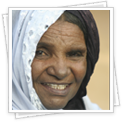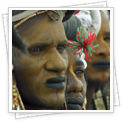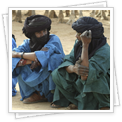
Cure Salée Festival Tour
8 days - departs Niamey
Jump at your chance to experience first-hand one of the Africa's oldest and most colourful traditional festivals. Set alongside an oasis on the edge of the Sahara desert the Cure Salée returns after many years absence.
Itinerary
| Day 1 | Meet & Greet at Niamey airport or bus station – transport to hotel. Overnight: Hotel Own meals. |
| Day 2 | Morning tour of Niamey before travelling to Tahoua township (stops to appreciate Hausa mud architecture). Overnight: Hotel B/D |
| Day 3 | Travel onto Ingall Oasis (traditional home of Cure Salée) Overnight: Tuareg Tent Camping under the stars on comfortable mattresses and rugs. B/D |
| Day 4 | Festival of Tuaregs with Peulh Guerewol dancing. Overnight : Tuareg Tents. B/D |
| Day 5 | Festival of Tuaregs with Peulh Guerewol dancing. Overnight : Tuareg Tents. B/D |
| Day 6 | Visit to the ancient city of Agadez, its camel market, artisans and the famous mosque and sultan's palace. Overnight: Hotel B/D |
| Day 7 | Travelling day to Niamey. Overnight : Hotel B/D |
| Day 8 | Transfer to airport or stations for return or onward journeys. B |

Festival Background
The Cure Salée is one of the world’s oldest festivals stretching back over hundreds of years.
The annual Festival marks the end of the rainy season by the nomadic Tuareg and Wodaabe people of northern Niger. Herdsmen and pastoralists who have let their livestock roam and feed around the north during the wetter months come together in Ingall (a small town located alongside an oasis and salt flat) before pushing south to avoid the dry season in the Sahara.
The nomadic clans and families use the occasion for their annual catch-up, celebration and to allow couples to court and arrange marriages according to their traditions.
The Festival is colourful, loud and entertaining, and runs well into the nights.
Amongst other things you’ll see for yourself the iconic images of young Wodaabe men decorated up and performing ‘Geurewol’ – their mating ritual to attract a wife. Traditional musical instruments, songs, dancing and costumes become commonplace over the short annual festival.
2011 marked the first Festival for a number of years due to the Tuareg Rebellion, a military coup and subsequent security situation. With the worsening security situation in the north of Niger the Cure is not currently open to visitors.

Peoples Background
Wodaabe
The Wodaabe people (aka Bodaabo, Mbororo or Bororo) are small subgroup (<50,000 pop.) of the greater Fulani (aka Peul) people. The Wodaabe especially well known for their magnificent male face painting, elaborate clothing and rich cultural ceremonies including the Geurewol courtship ritual.
Traditionally the greater Fulani tribes were nomadic livestock herders travelling with their herds of cattle from pasture areas to trading zones although greater numbers of them now have planted roots in townships and no longer live as nomads. The Fulani were instrumental in the Islamisation of West Africa.
Whilst being Muslim the Wodaabe, as have some Fulani, in addition have maintained many elements of their pre-Islamic, animist and spiritual cultures. The culture of 'pulaaku' for instance is characteristic for all Wodaabe. Pulaaku can be described as the ‘right attitude’ for a Wodaabe person. It is distinguished by virtues such as self-discipline, chivalry, decorum and modesty.
Unlike their Fulani cousins the Wodaabe today in Niger have largely maintained their original nomadic lifestyles. Their preferred cattle breed is the zebu, which the cows are adorned with large moon shaped horns. The Wodaabe consider these cattle beautiful, and write about them lovingly in poems.
Beauty is an important element for the Wodaabe themselves. Women and men decorate themselves with makeup, clothes and jewellery of all kinds. Women also wear geometric tattoos on their cheeks and forehead.
The Geurewol, is a particular dance during a special feast where members of befriended clans get together. It is the occasion for young men and women to present themselves for admiration, hoping to find partners for love and marriage. For Wodaabe men being beautiful means having a long and slender body shape, a light coloured skin and clear white teeth, along with a long, straight nose with large white eyeballs surrounded by big dark eye sockets.
The clothes, jewellery, decoration and make up are all used to emphasize these elements of physical beauty. During the Geurewol Festival the young men dance for hours, showing their beauty and endurance, while young women make their appreciation known in a subtle, but unmistakably Wodaabe way.

Tuareg
The Tuareg are known as the ‘blue people of the desert’ and are another of the nomadic tribes of the Sahara. Known for their expert desert survival and cameleering skills they are famous of the ‘salt caravans’ that bring salt from the Saharan mines to the markets.
The salt flats around Ingall are known for its medicinal and regenerative purposes - the ‘salt cure’ or Cure Salée in French makes the ideal location to spell the herds of camels, goats and cattle before heading south.
The Tuareg were amongst the fiercest fighters in Africa when the French began colonising North Africa. Yet they were also skilful merchants often responsible for the overland transportation of many goods. Old Tuareg traditions place great value in the nobility and preparedness for fighting so you should expect to see beautiful silver jewellery amongst Tuareg women and fancy swords amongst the men. The ‘three cups of tea’ ceremony is also traditional when bartering for goods.
- Casual clothes suitable for dusty and sandy environments
- Hats, sunscreen, personal water bottles
- Women: Please bring long skirts or trousers, long-sleeved tops and a headscarf for possible visits to Islamic mosques. These won’t be needed during the festival however.
- Personal toiletries and medications
- Photography equipment
- A relaxed and flexible attitude for experiencing non-touristy Africa
- A few words of French
- Alcohol is freely permitted if you wish to bring you own
What to bring;
